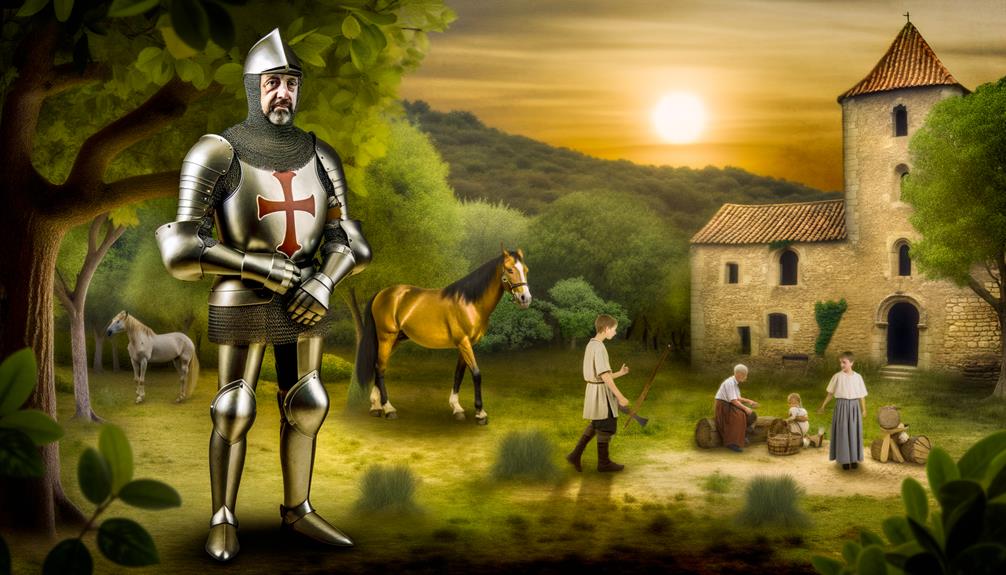Christopher Name Meaning and Origin
The name Christopher originates from the Greek 'Christophoros,' translating to 'bearer of Christ.' It emerged in the Hellenistic period, combining 'Christos' (Christ) and 'phoros' (to bear). Saint Christopher, the patron saint of travelers, popularized the name due to its strong Christian connotations and symbolic significance.
Over centuries, historical figures like Christopher Columbus and Christopher Wren further cemented its legacy. The name has permeated various cultures, literature, and modern usage, consistently appearing in baby name charts.
If you continue exploring, the rich heritage and enduring popularity of this name will be revealed.

Key Takeaways
- The name Christopher means 'bearer of Christ,' derived from the Greek name Christophoros.
- Originated in the Hellenistic period, combining 'Christos' and 'phoros.'
- Associated with Saint Christopher, the patron saint of travelers.
- Widely used in Christian cultures for its religious symbolism.
- Modern variations include Chris and Kit, consistently popular in baby name charts.
Etymology and Origins
Derived from the Greek name Christophoros, meaning 'bearer of Christ,' the name Christopher has deep roots in early Christian traditions and linguistic history. Originating in the Hellenistic period, Christophoros combined the elements 'Christos,' referring to Christ, and 'phoros,' meaning bearer or carrier.
The name became prevalent in the Byzantine Empire, reflecting the spread of Christianity. Through Latin adoption as Christophorus, it entered various European languages, preserving its phonetic integrity. In Old English, it appeared as Cristoforus, before evolving into the modern English form, Christopher.
The name's endurance across centuries underscores its linguistic adaptability and cultural significance, maintaining a consistent presence in Christian and secular contexts alike. This etymological journey highlights the name's rich historical and linguistic heritage.
Religious Significance
The name Christopher holds substantial religious significance, primarily attributed to its association with Saint Christopher, the patron saint of travelers.
Rooted in Biblical traditions, the name translates to ‘bearer of Christ,’ reflecting its early Christian origins. The name Christopher has been popular throughout history and can be found across various cultures. It is often associated with strength and devotion, making it a fitting choice for many Christian families. The origins of Christian names can provide insight into the values and beliefs of the time period in which they were most commonly used.
Its enduring popularity across centuries underscores its deep-seated spiritual and cultural resonance.
Patron Saint of Travelers
As the patron saint of travelers, Saint Christopher holds a significant place in Christian hagiography and religious tradition. His legacy is rooted in the story of him carrying a child, who later revealed Himself as Christ, across a perilous river. This act symbolizes the saint's role in safeguarding those on journeys.
The name 'Christopher' itself means 'Christ-bearer,' reflecting this narrative. His veneration includes the following:
- Medals and Pendants: Often carried by travelers for protection.
- Feast Day: Celebrated on July 25th in Western Christianity.
- Iconography: Depicted as a giant with a child on his shoulder.
- Pilgrimages: Sites dedicated to Saint Christopher attract numerous visitors seeking blessings for their travels.
Saint Christopher's influence continues to resonate globally.
Biblical Roots and Popularity
While Saint Christopher's legacy as the patron saint of travelers is widely celebrated, the significance of the name 'Christopher' also finds its roots in Biblical and religious contexts, contributing to its enduring popularity. Derived from the Greek 'Christophoros,' meaning 'bearer of Christ,' the name encapsulates profound theological symbolism.
Historically, it has been associated with individuals who bore Christ in their hearts and deeds. Early Christian texts and traditions emphasize this concept, reinforcing the name's spiritual resonance. Linguistic analysis reveals its consistent usage across various Christian cultures, further cementing its widespread appeal.
Consequently, the name 'Christopher' persists not only for its religious connotations but also for its embodiment of faith and devotion throughout centuries.
Historical Figures
Many notable historical figures have borne the name Christopher, each contributing greatly to their respective fields and eras. The name, derived from the Greek 'Christophoros,' meaning 'bearer of Christ,' has found prominence through varied historical contexts:
- Christopher Columbus – An Italian explorer whose 1492 voyage led to the European awareness of the American continents.
- Christopher Wren – A seminal English architect, best known for his work on St. Paul's Cathedral in London.
- Christopher Marlowe – An influential English playwright and poet of the Elizabethan era, contemporary to Shakespeare.
- Christopher Isherwood – A renowned 20th-century English-American novelist, known for his contributions to modern literature.
Each Christopher has left an indelible mark, reflecting the enduring legacy of this storied name.
Cultural Impact
Christopher, a name steeped in religious and historical significance, has permeated various cultural mediums, influencing literature, film, and popular culture globally. Its etymology, meaning "bearer of Christ," has inspired countless narratives across time. From the legendary St. Christopher to contemporary icons like Christopher Reeve, the name evokes heroism and moral integrity.
| Medium | Notable Figure | Impact |
|---|---|---|
| Literature | Christopher Robin | Symbol of innocence and adventure |
| Film | Christopher Nolan | Innovation in cinematic storytelling |
| Music | Chris Martin | Emotional resonance in lyrics |
| Religion | St. Christopher | Patron saint of travelers |
| Television | Chris Evans | Embodiment of modern heroism |
Through these varied representations, Christopher continues to shape cultural narratives globally.
Popularity Over Time
The name Christopher has experienced fluctuating levels of popularity throughout history, influenced by cultural, religious, and social factors. Its usage can be traced back to early Christian traditions, where it gained prominence due to its association with Saint Christopher, the patron saint of travelers.
The name's popularity surged during various historical periods, including the Middle Ages and the Renaissance.
To illustrate its popularity over time:
- 14th Century: Gained traction due to veneration of Saint Christopher.
- 19th Century: Experienced a decline in usage.
- 1960s-1980s: Reached peak popularity in many English-speaking countries.
- 21st Century: Although its usage has declined, it remains a classic choice.
Understanding these trends provides valuable insight into the enduring appeal of the name Christopher.
Variations and Nicknames
Exploring the variations and nicknames of Christopher reveals a rich tapestry of linguistic evolution, shaped by cultural exchanges and historical developments. Originating from the Greek name Christophoros, meaning 'bearer of Christ,' Christopher has transformed across languages and regions.
In Germanic languages, it appears as Christoph, while in Spanish and Italian, it is Cristóbal and Cristoforo, respectively. The French variation, Christophe, further illustrates its adaptability.
Nicknames such as Chris, Kit, Topher, and Kester provide informal alternatives, each reflecting unique phonetic and cultural influences. Chris, the most prevalent, offers a modern, truncated form, whereas Kit harks back to medieval England. Topher and Kester, though less common, showcase creative linguistic truncations.
These variations highlight Christopher's enduring versatility and global resonance.
Famous Christophers
The name Christopher has been borne by numerous influential individuals across various fields, highlighting its enduring appeal and versatility.
In Hollywood, figures such as Christopher Nolan and Christopher Walken have made significant contributions to cinema.
Historically, Christopher Columbus remains a pivotal figure in the Age of Exploration, while in sports, athletes like Christopher Eubanks have gained renown for their achievements.
Hollywood's Leading Christophers
Among the most influential figures in Hollywood, several actors named Christopher have left an indelible mark on the film industry. Their contributions span decades and genres, showcasing the versatility and depth associated with the name.
Here are notable Christophers whose careers have significantly shaped cinematic history:
- Christopher Walken: Known for his unique voice and eccentric characters, Walken's career includes iconic roles in films like 'The Deer Hunter' and 'Pulp Fiction.'
- Christopher Reeve: Revered for his portrayal of Superman, Reeve became a symbol of heroism both on and off-screen.
- Christopher Nolan: As a director, Nolan's visionary storytelling in films like 'Inception' and 'The Dark Knight' trilogy has redefined modern cinema.
- Chris Hemsworth: Best known as Thor in the Marvel Cinematic Universe, Hemsworth's performances have garnered global acclaim.
Historic Figures Named Christopher
Christopher Columbus, an Italian explorer whose 1492 journey led to the European discovery of the Americas, remains one of the most pivotal figures in world history. His expeditions across the Atlantic Ocean under the auspices of the Spanish monarchy initiated widespread European exploration and colonization.
Another notable Christopher is Christopher Wren, an eminent English architect whose works include the iconic St. Paul's Cathedral in London. Wren's contributions to architecture during the late 17th and early 18th centuries had a profound influence on the development of English Baroque style.
Both individuals, though separated by centuries and disciplines, exemplify the far-reaching impact of those named Christopher, underlining the name's historical and cultural significance through their groundbreaking achievements.
Renowned Athletes Named Christopher
Celebrating the achievements of athletes named Christopher reveals a legacy of excellence across various sports, underscoring the name's association with success and determination. Historically, the name Christopher has been associated with leadership and resilience, traits reflected in the careers of several renowned athletes. Their contributions not only highlight individual prowess but also enrich the historical narrative of sports.
- Christopher Wondolowski: A celebrated figure in Major League Soccer, he holds the record for the most goals scored in the league.
- Chris Paul: An NBA superstar, his career is marked by multiple All-Star selections and leadership on the court.
- Chris Evert: A tennis legend, she dominated women's singles with 18 Grand Slam titles.
- Chris Froome: A preeminent cyclist, he has won the Tour de France four times.
Modern Usage
In contemporary settings, the name Christopher remains popular and widely used across various cultures and regions. Historically, its roots are traced back to early Christian traditions, with the name signifying 'bearer of Christ.'
Linguistically, the name has been adapted into multiple languages, including Christophoros in Greek and Cristóbal in Spanish. Modern usage reflects its continued appeal due to its classic resonance and versatility. In English-speaking countries, Christopher frequently appears in formal contexts, while its diminutives, such as Chris and Kit, offer more casual alternatives.
The name's enduring popularity is evidenced by its consistent ranking in baby name charts, underscoring its timeless charm and widespread acceptance. Consequently, Christopher remains a relevant and beloved choice in contemporary nomenclature.
Conclusion
Christopher's etymological roots, religious significance, and historical prominence underscore its colossal impact on culture and society.
From legendary saints to contemporary icons, the name Christopher has transcended millennia, shaping and reshaping its essence through linguistic evolution and societal shifts.
Its enduring popularity and myriad variations attest to its unparalleled adaptability and timeless appeal.
The name Christopher, henceforth, emerges not merely as a name, but as an indelible emblem of historical grandeur and cultural dynamism.






